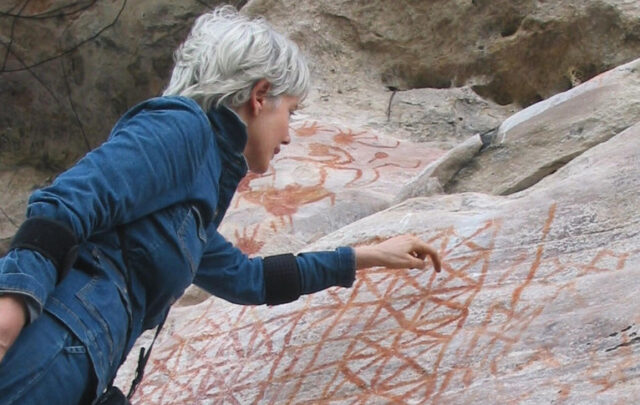The following is the script for a talk about the film They Made the Land, a 19-minute film which can be seen here.
I’m a great supporter of community energy generation, but I want to talk about another form of energy, one which I consider to be an essential component of our future energy economy, and perhaps more importantly, one which could affect our fundamental sense of wellbeing.
I’m talking about food: human fuel. The film shows humans interacting with their fundamental energy supply and speaks optimistically about the ways we’ve found to develop that to our advantage. When this relationship is local: people working the earth around the place they live, there are built in feedback mechanisms which deter people from over-riding the land’s capacity to support them. So this is a pretty sustainable fuel.
All fuels have a ratio called EROEI: Energy Return On Energy Invested. This means that I need to use a certain amount of energy to get hold of my fuel before I can use it do do other stuff. In the early days of oil, it’s EROEI was about 100:1 – for every one unit of energy I put in to get my oil, I’d get 100 units of energy out. This ratio has dwindled over the years to more like 19:1 or less, depending on how I get hold of it.
By comparison, the EROEI of coal at the moment is about 50:1, nuclear is between 1.1:1 and 15:1, wind power is about 18:1 and hydro ranges from 11:1 to 267:1.
The EROEI of food depends on a range of variables. In ‘The Crash Course’, Chris Martenson says:
If the amount of food people need to get more food to stay alive, is exactly equal then we’d find that the their society would not be terribly complex. If, instead, these people were able to produce just 1.2 calories for every 1 calorie expended, then they’d have the energy balance that existed in medieval times. This skinny 20% surplus is sufficient to allow hierarchies to form, job specialisation to develop, and large works of architecture to be built.
With fossil fuels, the EROEI will always get lower. Even though we may find more, and get better at extracting them: in the end they are a finite resource. And as we all know, they’re also highly polluting. It is established beyond all reasonable doubt that the implications of our continued use of fossil fuels are grim. One of our highest priorities needs to be getting off them as quickly and thoroughly as we can.
There’s debate about whether we can replace the the energy we get from oil with renewable sources. Like many others, I think it’s unlikely that we can do this completely. But also: we don’t actually need to live the high energy lifestyles that we’ve got used to over the last few decades. By making a few changes, we could have at least enough energy to do the important things: to keep warm; get our food; keep our hospitals open…
But the changes I’m talking about are not the ‘turn your thermostat down’ or ‘change your lightbulbs’ kind. They’re profound changes to the way we get the basics that we need to sustain ourselves and thrive.
Cheap oil and neo-liberal politics have combined to give us a situation where we get most of the things we need from far away. Where 100 years ago, I might have got most of my food, fuel, clothing: my essentials – from within the British Isles and a good deal of that from within 100 miles or so of where I lived, now I struggle to find anything that is 100% locally produced. Where 100 years ago I relied on the people living around me to meet most of my needs; now, I rely more on exploited employees in factories in China and farms in Kenya.
Living more locally holds huge potential for using less energy; for having a real, lived understanding of my dependance on the earth and a subsequent consideration of how I use it, and for developing a true sense of community, not the guilty ‘I should get to know the neighbours’, but the lived experience of genuine interdependence.
I’m not intending to romanticise this way of life. People have gravitated towards the comfort and convenience we’ve built on oil for understandable reasons. But after a certain point, comfort and convenience don’t make us happy: they make us unhealthy and depressed. Bit by bit, we’ve lost a sense of meaning in our work – even in our lives. Biologically we’re still hunter-gatherers, and knowing that through my labour I’ve filled my loved ones’ bellies, or kept them warm for another day is indescribably more satisfying than knowing that I’ve stacked enough tins, met ‘targets’ set by someone else, or clicked ‘send ‘on the 100th email of the day.





